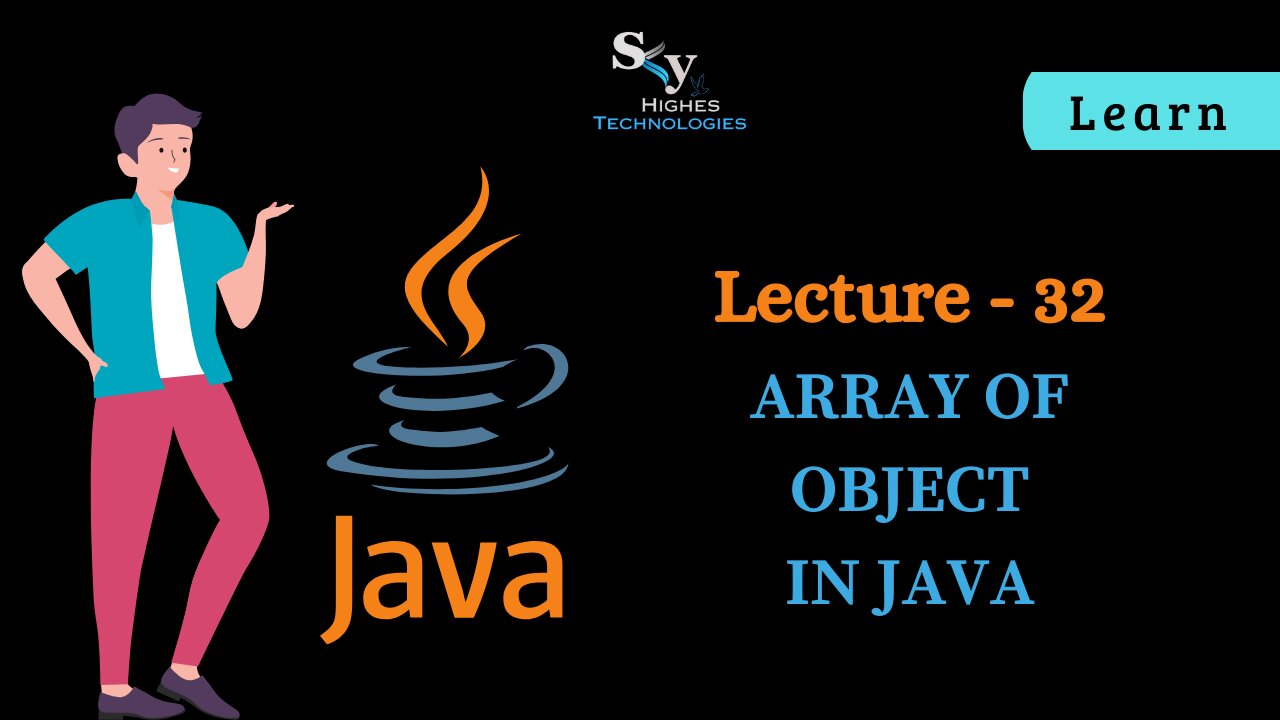Premium Only Content

#32 Array of Object in JAVA | Skyhiges | Lecture 32
Here's a comprehensive explanation of arrays of objects in Java:
Storing Objects in Arrays:
While arrays typically store primitive data types, Java also allows you to store objects.
This enables you to manage collections of objects with similar properties and behaviors, using convenient array features.
Creating an Array of Objects:
Declare the array using the class name:
Java
Employee[] employees = new Employee[5]; // Declares an array that can hold 5 Employee objects
Use code with caution. Learn more
Instantiate each object individually:
Java
employees[0] = new Employee("John", "Doe", 25);
employees[1] = new Employee("Jane", "Smith", 30);
Use code with caution. Learn more
Accessing Object Members:
Use the array index to access the object, then the dot notation to access its members:
Java
System.out.println(employees[0].getName()); // Prints "John"
employees[1].setAge(35); // Updates the age of the second employee
Use code with caution. Learn more
Key Points:
Arrays store references to objects, not the objects themselves.
Each object in the array is independent, with its own state and behavior.
Modifying an object in the array doesn't affect other objects in the array.
Benefits of Using Arrays of Objects:
Organize similar objects: Group objects of the same type for efficient management.
Iterate and process collections: Use loops to apply operations to all objects in the array.
Pass as arguments and return values: Pass entire arrays to methods or return them as results.
Create multidimensional arrays: Store matrices or grids of objects for complex data structures.
Example:
Java
class Employee {
private String name;
private String role;
private int age;
// Constructor and getters/setters omitted for brevity
}
// Create an array of Employee objects
Employee[] team = new Employee[3];
team[0] = new Employee("Alice", "Developer", 32);
team[1] = new Employee("Bob", "Manager", 45);
team[2] = new Employee("Charlie", "Designer", 28);
// Print the names of all employees
for (Employee emp : team) {
System.out.println(emp.getName());
}
Use code with caution. Learn more
Remember:
Choose arrays of objects when you need to manage a collection of similar objects with a fixed size.
For dynamic collections with more flexibility, consider using lists or other Java Collections Framework classes.
-
 DVR
DVR
IsaiahLCarter
8 hours ago $2.06 earnedCharlie Kirk, American Martyr (with Mikale Olson) || APOSTATE RADIO 028
32K -
 16:43
16:43
Mrgunsngear
11 hours ago $2.22 earnedKimber 2K11 Pro Review 🇺🇸
27.8K12 -
 13:40
13:40
Michael Button
1 day ago $0.94 earnedThe Strangest Theory of Human Evolution
17.4K16 -
 10:19
10:19
Blackstone Griddles
1 day agoMahi-Mahi Fish Tacos on the Blackstone Griddle
12.4K3 -
 23:51
23:51
Jasmin Laine
1 day ago“Stop Wasting My Time!”—Trump's BRUTAL WARNING To Canada As Poilievre ROASTS CBC LIVE
10.1K26 -
 9:54
9:54
Millionaire Mentor
1 day agoNBC Host EXPOSES JB Pritzker For Saying This About Trump
5.86K9 -
 1:35:39
1:35:39
SB Mowing
2 days agoIt took the WHOLE NEIGHBORHOOD to uncover this yards SHOCKING SECRET
91.2K63 -
 12:52
12:52
ROSE UNPLUGGED
1 day agoFrom Vision to Legacy: Charlie Kirk
59.4K21 -
 1:14:22
1:14:22
Jeff Ahern
9 hours ago $11.82 earnedThe Sunday Show with Jeff Ahern
83.2K35 -
 16:37
16:37
Professor Nez
9 hours ago🚨Internet MELTS DOWN over JD Vance & Trump BREAKING the Democrats!
73.7K194